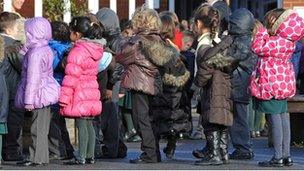Fund primary places not free schools, Labour urges
- Published

The average size of a primary school is 224 pupils, but many are much bigger
The government should tackle the growing crisis in primary school places rather than approve more free schools, says shadow education secretary Stephen Twigg.
The equivalent of 2,000 primary schools' worth of children - some 450,000 - need to be found places in England's schools by 2015, he says.
Cash should be allocated where it is needed the most, he adds.
The government says it will spend £4bn on easing the pressure.
This sum includes £1.9bn already announced for 2011-12 and an extra £600m announced in the autumn.
'Real need'
It also includes a further £800m for the coming two years, which the Department for Education is expecting to be allocated.
But Mr Twigg accuses the government of "ignoring" what he says is a growing crisis.
He highlights the fact that much of the money promised for new places has been ear-marked for free schools - the majority of which are secondaries where pupil numbers are falling.
As free schools are parent-promoted they do not necessarily emerge where the population pressure points are.
Mr Twigg says it would make more sense to spend the money on tackling the shortfall in primary school places, but that this could include some free schools.
He says: "Across England we need nearly half a million more primary places - the equivalent of building an extra 2,000 primary schools between now and the general election.
"At the moment, the government has only promised an extra 100 new free schools, many of which will be secondaries.
"The government seems oblivious to the problem, preferring to focus on pet projects rather than real need.
"If we are to improve the number and quality of our primary schools, the government needs to start rolling up its sleeves."
'Salami slicing'
Mr Twigg is not saying that 2,000 primary schools need to be built, and readily acknowledges that many of the children could be accommodated in expanded primaries.
But he urged ministers to address the issue head-on in the Budget, "allocating all its education capital to meeting real need, not salami slicing some off for pet projects".
He added that if the government did not address the real need the effect on pupils' education would be dramatic, with many "squeezed into temporary bulge classrooms in Portakabins".
The problem is particularly acute in London with 100,000 places required by 2015. Extreme measures are being taken to tackle the problem.
In Barking and Dagenham, where an extra 8,000 places are needed, the council are proposing to rent out an empty Woolworths and an empty MFI store. And in Sutton, the council leader has asked for permission to end the infant class size limit of 30.
In Brighton, where 2,000 more places are required, there are plans to teach children in a football stadium, a bingo hall and redundant churches.
And in Lancashire alone a whopping extra 14,000 places are needed and predictions show 11,000 places are needed in Birmingham, Leeds, Hertfordshire and Hampshire.
'Hypocrisy'
Education Secretary Michael Gove accused Labour of hypocrisy, saying: "For years they ignored warnings about the baby boom and splurged billions on extravagant and expensive secondary school projects instead.
"When we said there was a problem, they dismissed our calls as 'nonsense'.
"By contrast, we have more than doubled funding for extra places to give local authorities the resources they need.
"Instead of shirking responsibility, Stephen Twigg should admit his party's mistakes and back this government's actions to sort the problem out."
He also accused Labour of cutting funding for extra school places by 26%, saying he had doubled funding to £800m a year.
But this came after he scrapped the primary school building programme which aimed to rebuild half of all primary schools by 2023.
- Published14 March 2012
- Published10 January 2012
- Published3 March 2012